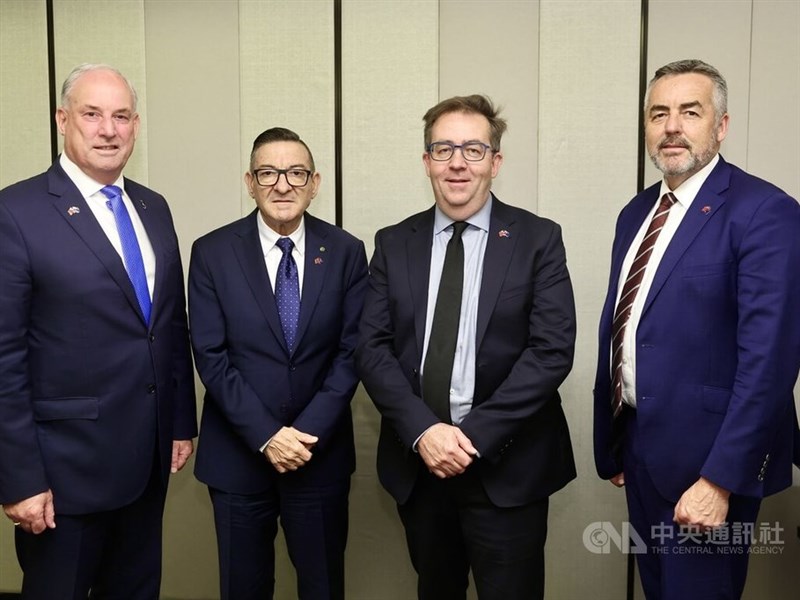
Houston, May 20 (CNA) Raymond Greene, the de facto U.S. ambassador to Taiwan, has expressed optimism about trade negotiations between Taipei and Washington that were prompted by Trump's announcement of sweeping import duties on America's trading partners.
"I'm confident that ultimately we will come to a conclusion and come to create a system that is much fairer to American workers, but also benefits our major trading partners, especially trading partners like Taiwan," Greene said during an interview with CNA in Houston.
Greene, who serves as director of the American Institute in Taiwan's (AIT) Taipei Main Office, was in Houston heading a delegation of more than 100 representatives from Taiwanese companies. The visit was part of broader efforts to encourage more Taiwanese investment in the United States.
The AIT director declined, however, to offer specifics on the bilateral talks -- including a timeline -- saying only, "As far as I understand, the discussions are going quite smoothly."
Despite concerns from some in Taiwan that Taiwan-U.S. relations would be overshadowed by Trump's pledged tariffs, Greene said bilateral ties remained "extremely robust."
The two sides have continued to work closely to strengthen security capabilities, enhance social resilience and promote economic development, said Greene, who took office last July.
In early April, U.S. President Donald Trump said his administration would impose "reciprocal" tariffs on imports from about 185 countries and territories, including a blanket levy on Taiwanese goods of 32 percent.
Trump later suspended the tariffs for 90 days and imposed a reduced 10 percent duty on most countries instead.
Negotiations between the two sides have followed, with Taiwan presumably seeking to bring down the tariff rate by pledging increased investment in the U.S. and greater purchases of American goods, though details of what has been discussed are scarce.
The Trump administration has said in the past week it will be unilaterally imposing new rates on trading partners in the next two to three weeks because it lacks the ability to negotiate individual trade deals with over 100 countries at once.
It is not yet clear if Taiwan will be among them.
Commenting on cross-Taiwan Strait relations, Greene expressed concern over China's aggressive actions against Taiwan and urged both sides to try to engage in dialogue to resolve their disputes.
"We are worried about gray-zone activity," he said of coercive actions that stop short of direct military conflict or war, adding that China had also exerted increased pressure on Taiwan in the diplomatic, military, economic and legal spheres.
Washington "oppose[s] any use of force or coercion to change the status quo in the Taiwan Strait or Taiwan status," Greene said, adding that "preventing a conflict in the Indo-Pacific or the Taiwan Strait from breaking out is an absolute top priority for us."
"That's why we're so focused on fulfilling our Taiwan Relations Act requirement to provide Taiwan with the defense materials and services it needs to preserve peace and security in the Taiwan Strait, as well as to maintain sufficient deterrent capabilities by the United States to deter conflict," he said.
![Taiwan would make great CPTPP member: Australian lawmaker]() Taiwan would make great CPTPP member: Australian lawmakerTaiwan will be a great member of a regional trade bloc that Australia is part of, given its track record as a "trusted economic partner," a visiting Australian lawmaker said Monday.10/20/2025 06:20 PM
Taiwan would make great CPTPP member: Australian lawmakerTaiwan will be a great member of a regional trade bloc that Australia is part of, given its track record as a "trusted economic partner," a visiting Australian lawmaker said Monday.10/20/2025 06:20 PM![For Taiwanese circus performer, life on the road not all fun and games]() For Taiwanese circus performer, life on the road not all fun and gamesA man emerges from backstage into the ring, tosses a diabolo high into the air and catches it with a string. Then two, then three, juggling the hourglass-shaped tops with impeccable precision, as if they were extensions of himself.09/29/2025 07:55 PM
For Taiwanese circus performer, life on the road not all fun and gamesA man emerges from backstage into the ring, tosses a diabolo high into the air and catches it with a string. Then two, then three, juggling the hourglass-shaped tops with impeccable precision, as if they were extensions of himself.09/29/2025 07:55 PM![Aunt, uncle's sacrifice saved 6-year-old girl trapped by floodwaters in Taiwan: Rescuer]() Aunt, uncle's sacrifice saved 6-year-old girl trapped by floodwaters in Taiwan: RescuerA lead rescuer in the flood rescues in eastern Taiwan's Hualien County has recounted to CNA how his team saved a 6-year-old girl trapped inside a house for over a day after a lake created by a landslide overflowed and flooded the town, crediting her survival to the sacrifice of her aunt and uncle in their final moments.09/27/2025 02:37 PM
Aunt, uncle's sacrifice saved 6-year-old girl trapped by floodwaters in Taiwan: RescuerA lead rescuer in the flood rescues in eastern Taiwan's Hualien County has recounted to CNA how his team saved a 6-year-old girl trapped inside a house for over a day after a lake created by a landslide overflowed and flooded the town, crediting her survival to the sacrifice of her aunt and uncle in their final moments.09/27/2025 02:37 PM
- Cross-Strait
Taiwan slams China for designating Oct. 25 'Taiwan Restoration' day
10/24/2025 11:09 PM - Society
3,000 march in Taipei to support transgender community
10/24/2025 10:19 PM - Society
Hog farms test negative for ASF virus, concerns remain: Minister
10/24/2025 09:15 PM - Politics
Austria resumes recognition of Taiwan-issued driving permit: MOFA
10/24/2025 08:34 PM - Politics
Taiwan pairs with Czech Salvation Army to help displaced Ukrainian youth
10/24/2025 08:21 PM


